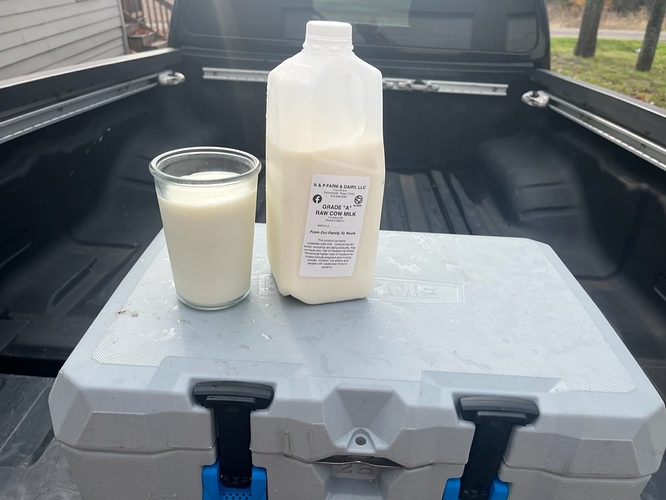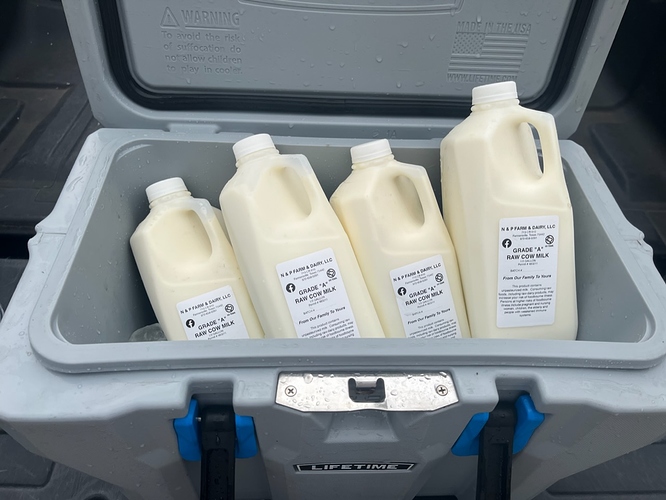Any truth to the suggestion that dairy products (whole fat) causes or aggravates inflammation? Yogurt, cheeses, sour cream, half and half, etc.
Whole fat dairy
It is possible. Some people react badly to one or another of the milk proteins (unrelated to lactose intolerance), and that reaction can be inflammatory.
How would I know if one or more whole milk products is causing or aggravating inflammation?
eliminate it all. dump all dairy. wait about 2-4 wks then add back. slowly. you will know when the body responds cause it WILL show you truths.
easy as that actually. but many won’t go there on the dump it to learn if it truly is a bad reaction or if you can add it back and be ok on some.
many react to dairy. just google ‘inflammation on dairy’ and you hit tons of real truths on it literally and then ya got the people who react to it and dump it and thrive so much better. they add it back and whammo they get stiff joints and maybe some gut upsets etc.
dairy is not natural. it is ‘made for us’ ya know. Even in life back in the ancient times, some raw milk from an animal lactating could be had ya know, but no animal was making yogurt. No animal was making cheese. No animal was making nothing but milk for its infant to thrive so??
dairy falls into a weirdo category for many. Plus for me personally I can do some hard aged cheese easily. great on it. feed me something soft like cream cheese or mozzarella etc. it slides thru my guts and the diarehhea can hit easily for me…yuk. avoid at all costs LOL and I do limited hard aged cheese now and thrive on it.
so key is find you on dairy.
I find, if I overdo it, which I too often do, the full fat dairy can make me feel sluggish, and very full, so I desire no more food after that. If it’s inflammatory is less of a sure thing, as because of my medication, I get aches anyway.
I listened to a podcast with two women discussing inflammation brought on by dairy. And the woman gave a great advice. If you have eliminated dairy along with other foods, sugar, gluten etc, and when you bring dairy back in your pains and aches comes back, well that’s a red flag. So look out for symptoms of aches and pains when re-introducing dairy to your WOE. They also talked about moderation versus full blown addiction, and that some of us, we do better abstaining as we can’t be moderators.
Of course I am not much of a moderator myself and I decided to indulge heavily in my addiction this christmas. But after christmas I will reign my dairy intake back in again.
Oddly though, after indulging much more in cheese and cream, I have dropped more in weight. It really does seem the body is enjoying a high fat diet, and finds these foods so much more satisfying, bringing satiety.
Everyone is different of course, but it is my understanding that people with inflammatory reactions to dairy (other than lactose intolerance) are reacting to dairy protein, not the fat. So low fat vs full fat would not really matter much.
Either way, an elimination trial is really the only way to know.
Doin’ my best to mitigate you allergic folks of any pressure to consume it, a few gallons at a time.
I’m OK with some dairy, like cream and butter, but have issues with cheese and milk.
I’m the same, I think I’m OK with a little cream such as I have in my coffee and cooking with butter. For some reason milk and to a lesser degree yogurt, makes my body less than happy, but cheddar cheese and some cream cheeses seem fine. Cottage cheese, I also tend to avoid. Generally though, I find if it’s full fat it’s better handled by the body and I never even look at the reduced fat versions.
Typically no, some people have sensitivities to it, and some develop them, but if they do it’s dairy as a whole, not whole fat (shouldn’t even be a term) or otherwise. People like to automatically blame diary without ever confirming they actually have a problem with it. No different than Gluten and Artificial sweeteners.
If anything, lower fat diary would typically be more of a problem since it’d be higher lactose concentration, and that’s typically what people have an issue with, if anything. That said, lactase enzyme is usually all it takes to resolve that, differnt types can also have an effect.
Then there’s the argument that humans shouldn’t eat / drink cows milk… ok, then son’t eat the meat either, it’s an animal product. Cavemen also didn’t live in houses, cook their food half the time, or bath very often, last thing I’m doing is modelling my life around what people did thousands of years ago, we’ve moved on.
I find gouda and edam to be the kindest to my system. Although recently because we’ve been buying mature cheddar I’ve been eating a lot of that. I think this christmas, as there is no better time to indulge in my cheese addiction, I’ll pay a bit closer attention to how different cheeses make me feel. My partner and I plan to go to town with cream cheeses as we’re both equally cheese mad. After christmas, I’ll likely just return to cream in my coffee, butter for cooking and gouda/edam.
Then I guess inflammatory joint pain is typically not associated with dairy. Although “calcium” tendonitis to my thinking has something to do with dairy intake
I did have inflammatory joint pain when I was on a high carb, low fat, low sodium diet, and they were bad, constant knee pain and shooting pains from my hip down. When I, however, started keto simultaneously quitting gluten, those pains went, even though I still enjoyed dairy. So for me it was probably the gluten or the many many carbs I consumed. Keto to me has been most anti-inflammatory, with or without dairy. But I would, if I were you, eliminate it for a while just to see if those joint pains go away. If they do then it would obviously be worth for you giving up the dairy.
Dairy certainly can affect my joints and inflammation. I keep it at a minimum.
I don’t believe it’s the fat that causes the problem. I think most people are actually going to be OK with the fat except those who have extreme allergies to milk protein - ie butter still has some milk protein in it. I think I mentioned to you before that I moved to goat yogurt. I can add a third reason to my list of why now. I now believe the SAD yogurt causes me some prostate issues. American dairy has up to 70% A1 casein as a percentage of its total casein. As they digest it, many people have an enzyme which makes some casomorphin-7, which is in the opioid family. Goat and sheep dairy don’t share the A1 casein issues. Casomorphin-7 is very inflammatory, so A1 casein is probably best not consumed by people with auto-immune conditions. I gave up milk as a teenager, but was able to eat yogurt OK, although if I ate more than a cup, I could get a stomach ache. I plan to steer clear of A1 casein dairy as much as possible now.
I think it’s highly variable. I have tried not eating dairy and eating dairy, and cannot find a difference. While I typically keep to A2 proteins (goat, sheep, Jersey cows), I can easily eat “regular” dairy with zero issues I can tell.
I do find butter to be uniquely fattening for me. I can eat as much of it as I want, with zero satiety.
On the other hand, if I add cheese to my meat lunches, it seems to help satiety or at least does not cause a lack of satiety.
I have a theory this could be genetic. I’m 72% Eastern European and 100% European in genetics.
It could also be that I was on a very low fat diet and did not eat dairy for years, except on pizza. So, if I eat a piece of cheese, I do not want more.


